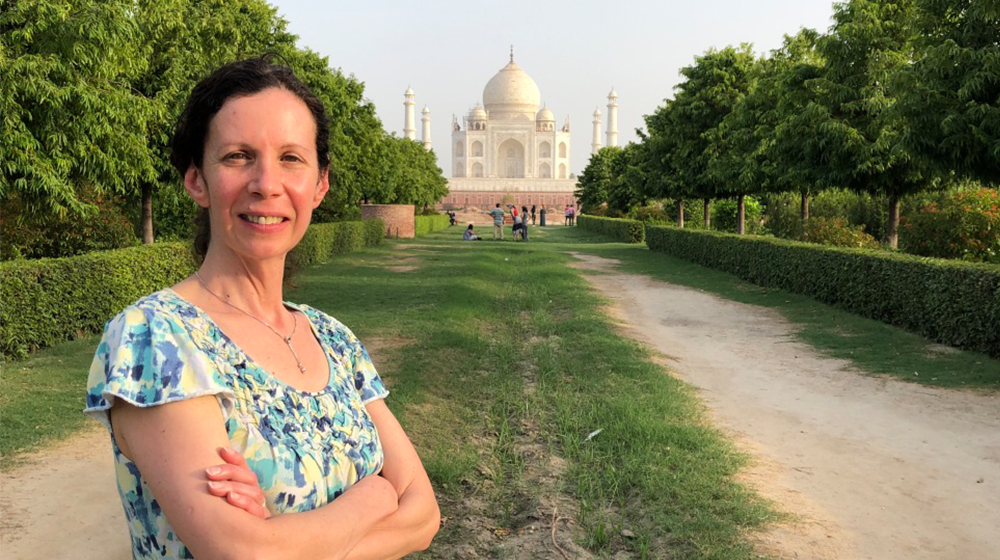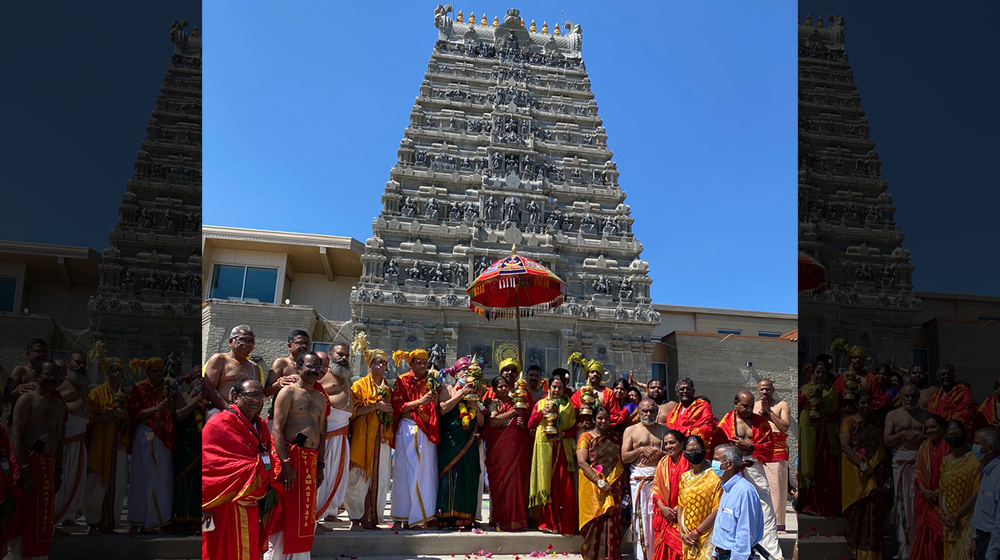Tracy Pintchman
Tracy Pintchman Published by Oxford University Press

Tracy Pintchman, professor of religious studies in the Department of Theology and director of the Global Studies program in the College of Arts and Sciences at Loyola University Chicago, has recently published Goddess Beyond Boundaries: Worshipping the Eternal Mother at a North American Hindu Temple with Oxford University Press.
“Dr. Pintchman’s research is advancing our understanding of faith and culture on a global scale,” said Peter J. Schrader, Dean of the College of Arts and Sciences. “Her innovative work on Hindu Goddess traditions showcases the intersection of religion and society, a true example of interdisciplinary scholarship.”
Throughout her 32 years at Loyola, Pintchman has focused on Hindu Goddess traditions and women’s religious rituals, adopting a global approach in this latest work. Her research has received support from the American Academy of Religion, the American Institute of Indian Studies, and the National Endowment for the Humanities.
Goddess Beyond Boundaries presents 15 years of field research on the Parashakthi Temple in Pontiac, Michigan, where the South Indian Goddess Parashakthi is worshipped. The temple's practices transcend ethnic, religious, and national boundaries, presenting the Goddess as a universal figure while maintaining deeply rooted Hindu traditions.

A small group standing outside of the Parashakti Temple in Pontiac, Michigan. Photo by Tracy Pintchman.
“It adopts a decolonial framework to highlight the religious creativity of immigrant Hindus in the United States,” Pintchman explained. By focusing on trans-local networks connecting the Michigan temple to a South Indian counterpart, she emphasizes how globalization and modern technology fuel new forms of religiosity.
Pintchman uncovers how the Parashakthi Temple has evolved into a site of theological and ritual innovation, and she hopes readers take away insights into the dynamic nature of Hindu rituals as they cross cultural boundaries.
“My current work explores how Hindu popular literature has reimagined religious narratives to a globalizing Hindu audience since India’s 1993 economic reforms and the concomitant rise of Hindu nationalism,” Pintchman added.
Her upcoming research will be featured in a special planned issue of International Journal of Hindu Studies.
Learn more about Pintchman, the Department of Theology, the Global Studies program, and her latest publication, Goddess Beyond Boundaries.
About the College of Arts and Sciences
The College of Arts and Sciences is the oldest of Loyola University Chicago’s 15 schools, colleges, and institutes. More than 150 years since its founding, the College is home to 20 academic departments and 37 interdisciplinary programs and centers, more than 450 full-time faculty, and nearly 8,000 students. The 2,000+ classes that we offer each semester span an array of intellectual pursuits, ranging from the natural sciences and computational sciences to the humanities, the social sciences, and the fine and performing arts. Our students and faculty are engaged internationally at our campus in Rome, Italy, as well as at dozens of University-sponsored study abroad and research sites around the world. Home to the departments that anchor the University’s Core Curriculum, the College seeks to prepare all of Loyola’s students to think critically, to engage the world of the 21st century at ever deepening levels, and to become caring and compassionate individuals. Our faculty, staff, and students view service to others not just as one option among many, but as a constitutive dimension of their very being. In the truest sense of the Jesuit ideal, our graduates strive to be “individuals for others.”

Tracy Pintchman, professor of religious studies in the Department of Theology and director of the Global Studies program in the College of Arts and Sciences at Loyola University Chicago, has recently published Goddess Beyond Boundaries: Worshipping the Eternal Mother at a North American Hindu Temple with Oxford University Press.
“Dr. Pintchman’s research is advancing our understanding of faith and culture on a global scale,” said Peter J. Schrader, Dean of the College of Arts and Sciences. “Her innovative work on Hindu Goddess traditions showcases the intersection of religion and society, a true example of interdisciplinary scholarship.”
Throughout her 32 years at Loyola, Pintchman has focused on Hindu Goddess traditions and women’s religious rituals, adopting a global approach in this latest work. Her research has received support from the American Academy of Religion, the American Institute of Indian Studies, and the National Endowment for the Humanities.
Goddess Beyond Boundaries presents 15 years of field research on the Parashakthi Temple in Pontiac, Michigan, where the South Indian Goddess Parashakthi is worshipped. The temple's practices transcend ethnic, religious, and national boundaries, presenting the Goddess as a universal figure while maintaining deeply rooted Hindu traditions.
“It adopts a decolonial framework to highlight the religious creativity of immigrant Hindus in the United States,” Pintchman explained. By focusing on trans-local networks connecting the Michigan temple to a South Indian counterpart, she emphasizes how globalization and modern technology fuel new forms of religiosity.
Pintchman uncovers how the Parashakthi Temple has evolved into a site of theological and ritual innovation, and she hopes readers take away insights into the dynamic nature of Hindu rituals as they cross cultural boundaries.
“My current work explores how Hindu popular literature has reimagined religious narratives to a globalizing Hindu audience since India’s 1993 economic reforms and the concomitant rise of Hindu nationalism,” Pintchman added.
Her upcoming research will be featured in a special planned issue of International Journal of Hindu Studies.
Learn more about Pintchman, the Department of Theology, the Global Studies program, and her latest publication, Goddess Beyond Boundaries.
About the College of Arts and Sciences
The College of Arts and Sciences is the oldest of Loyola University Chicago’s 15 schools, colleges, and institutes. More than 150 years since its founding, the College is home to 20 academic departments and 37 interdisciplinary programs and centers, more than 450 full-time faculty, and nearly 8,000 students. The 2,000+ classes that we offer each semester span an array of intellectual pursuits, ranging from the natural sciences and computational sciences to the humanities, the social sciences, and the fine and performing arts. Our students and faculty are engaged internationally at our campus in Rome, Italy, as well as at dozens of University-sponsored study abroad and research sites around the world. Home to the departments that anchor the University’s Core Curriculum, the College seeks to prepare all of Loyola’s students to think critically, to engage the world of the 21st century at ever deepening levels, and to become caring and compassionate individuals. Our faculty, staff, and students view service to others not just as one option among many, but as a constitutive dimension of their very being. In the truest sense of the Jesuit ideal, our graduates strive to be “individuals for others.”
